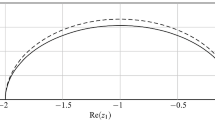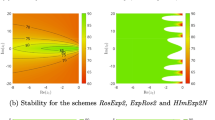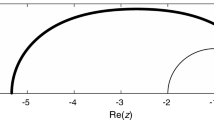Abstract
Implicit–explicit (IMEX) time stepping methods can efficiently solve differential equations with both stiff and nonstiff components. IMEX Runge–Kutta methods and IMEX linear multistep methods have been studied in the literature. In this paper we study new implicit–explicit methods of general linear type. We develop an order conditions theory for high stage order partitioned general linear methods (GLMs) that share the same abscissae, and show that no additional coupling order conditions are needed. Consequently, GLMs offer an excellent framework for the construction of multi-method integration algorithms. Next, we propose a family of IMEX schemes based on diagonally-implicit multi-stage integration methods and construct practical schemes of order up to three. Numerical results confirm the theoretical findings.






Similar content being viewed by others
References
Ascher, U.M., Ruuth, S.J., Spiteri, R.J.: Implicit–explicit Runge–Kutta methods for time-dependent partial differential equations. Appl. Numer. Math 25, 151–167 (1997)
Ascher, U.M., Ruuth, S.J., Wetton, B.T.R.: Implicit–explicit methods for time-dependent partial differential equations. SIAM. J. Numer. Anal. 32(3), 797–823 (1995)
Blaise, S., St-Cyr, A.: A dynamic hp-adaptive discontinuous Galerkin method for shallow-water flows on the sphere with application to a global tsunami simulation. Mon. Weather Rev. 140, 978–996 (2012)
Boscarino, S., Russo, G.: On a class of uniformly accurate IMEX Runge–Kutta schemes and applications to hyperbolic systems with relaxation. SIAM J. Sci. Comput. 31(3), 1926–1945 (2009)
Butcher, J.: Diagonally-implicit multi-stage integration methods. Appl. Numer. Math. 11(5), 347–363 (1993)
Butcher, J.: Numerical Methods for Ordinary Differential Equations. Wiley, New York (2008)
Butcher, J., Jackiewicz, Z.: Construction of diagonally implicit general linear methods of type 1 and 2 for ordinary differential equations. Appl. Numer. Math. 21(4), 385–415 (1996)
Butcher, J., Wright, W.: The construction of practical general linear methods. BIT Numer. Math. 43, 695–721 (2003)
Butcher, J.C., Jackiewicz, Z.: Diagonally implicit general linear methods for ordinary differential equations. BIT Numer. Math. 33, 452–472 (1993)
Butcher, J.C., Jackiewicz, Z.: Implementation of diagonally implicit multistage integration methods for ordinary differential equations. SIAM J. Numer. Anal. 34(6), 2119–2141 (1997)
Cardone, A., Jackiewicz, Z., Sandu, A., Zhang, H.: Extrapolation-based implicit-explicit general linear methods. Numerical Algorithms, pp. 1–23 (2013)
Comblen, R., Blaise, S., Legat, V., Remacle, J.F., Deleersnijder, E., Lambrechts, J.: A discontinuous finite element baroclinic marine model on unstructured prismatic meshes. Ocean Dyn. 60(6), 1395–1414 (2010)
D’Ambrosio, R., Butcher, J.: Multivalue numerical methods for partitioned differential problems: from second order ODEs to separable Hamiltonians. Presentation given at Auckland Numerical Ordinary Differential Equations ANODE 2013 (celebration of the 80th birthday of John Butcher) (2013)
Frank, J., Hundsdorfer, W., Verwer, J.: On the stability of implicit–explicit linear multistep methods. Appl. Numer. Math. 25(2–3), 193–205 (1997). (Special Issue on Time Integration)
Geuzaine, C., Remacle, J.F.: Gmsh: A 3-d finite element mesh generator with built-in pre- and post-processing facilities. Int. J. Numer. Meth. Eng. 79(11), 1309–1331 (2009)
Giraldo, F., Restelli, M., Läuter, M.: Semi-implicit formulations of the Navier–Stokes equations: application to nonhydrostatic atmospheric modeling. SIAM J. Sci. Comput. 32(6), 3394–3425 (2010)
Giraldo, F.X., Restelli, M.: A study of spectral element and discontinuous Galerkin methods for the Navier–Stokes equations in nonhydrostatic mesoscale atmospheric modeling: equation sets and test cases. J. Comput. Phys. 227(8), 3849–3877 (2008)
Hairer, E., Norsett, S., Wanner, G.: Solving Ordinary Differential Equations I. Nonstiff Problems. Springer, Berlin (1993)
Hundsdorfer, W., Ruuth, S.J.: IMEX extensions of linear multistep methods with general monotonicity and boundedness properties. J. Comput. Phys. 225(2), 2016–2042 (2007)
Jackiewicz, Z.: General Linear Methods for ODE. Wiley, New York (2009)
Kameni, A., Lambrechts, J., Remacle, J., Mezani, S., Bouillault, F., Geuzaine, C.: Discontinuous Galerkin Method for computing induced fields in superconducting materials. IEEE Trans. Magn. 48(2), 591–594 (2012)
Karna, T., Legat, V., Deleersnijder, E.: A baroclinic discontinuous Galerkin finite element model for coastal flows. Ocean Model. 61, 1–20 (2013)
Kennedy, C.A., Carpenter, M.H.: Additive Runge–Kutta schemes for convection–diffusion–reaction equations. Appl. Numer. Math. 44(1–2), 139–181 (2003)
Nair, R., Thomas, S., Loft, R.: A discontinuous Galerkin global shallow water model. Mon. Weather Rev. 133(4), 876–888 (2003)
Pareschi, L., Russo, G.: Implicit–explicit Runge–Kutta schemes and applications to hyperbolic systems with relaxation. J. Sci. Comput. 3, 269–287 (2000)
Prothero, A., Robinson, A.: On the stability and accuracy of one-step methods for solving stiff systems of ordinary differential equations. Math. Comput. 28(125), 145–162 (1974)
Seny, B., Lambrechts, J., Comblen, R., Legat, V., Remacle, J.F.: Multirate time stepping for accelerating explicit discontinuous Galerkin computations with application to geophysical flows. Int. J. Numer. Meth. Fluids 71(1), 41–64 (2013)
Seny, B., Lambrechts, J., Toulorge, T., Legat, V., Remacle, J.F.: An efficient parallel implementation of explicit multirate Runge–Kutta schemes for discontinuous Galerkin computations. J. Comput. Phys. 256, 135–160 (2014)
Skamarock, W.C., Klemp, J.B.: Efficiency and accuracy of the Klemp–Wilhelmson time-splitting technique. Mon. Weather Rev. 122(11), 2623–2630 (1994)
St-Cyr, A., Neckels, D.: A fully implicit jacobian-free high-order discontinuous Galerkin mesoscale flow solver. In: Allen, G., Nabrzyski, J., Seidel, E., Albada, G., Dongarra, J., Sloot, P. (eds.) Computational Science ICCS 2009. Lecture Notes in Computer Science, vol. 5545, pp. 243–252. Springer, Berlin (2009)
Verwer, J., Sommeijer, B., Hundsdorfer, W.: RKC time-stepping for advection–diffusion–reaction problems. J. Comput. Phys. 201(1), 61–79 (2004)
Wright, W.M.: General linear methods with inherent Runge–Kutta stability. Ph.D. thesis, The University of Auckland (2002)
Zhang, H., Sandu, A.: Implicit–explicit DIMSIM time stepping algorithms. arXiv:1302.2689
Zhang, H., Sandu, A.: A second-order diagonally-implicit–explicit multi-stage integration method. Procedia CS 9, 1039–1046 (2012)
Acknowledgments
This work has been supported in part by NSF through awards NSF OCI-8670904397, NSF CCF-0916493, NSF DMS-0915047, NSF CMMI-1130667, NSF CCF-1218454 AFOSR FA9550-12-1-0293-DEF, FOSR 12-2640-06, DoD G&C 23035, and by the Computational Science Laboratory at Virginia Tech. Sébastien Blaise is a Postdoctoral Researcher with the Belgian Fund for Research (FNRS).
Author information
Authors and Affiliations
Corresponding author
Additional information
This paper is dedicated to Prof. J.C. Butcher’s 80-th birthday.
Rights and permissions
About this article
Cite this article
Zhang, H., Sandu, A. & Blaise, S. Partitioned and Implicit–Explicit General Linear Methods for Ordinary Differential Equations. J Sci Comput 61, 119–144 (2014). https://doi.org/10.1007/s10915-014-9819-z
Received:
Revised:
Accepted:
Published:
Issue Date:
DOI: https://doi.org/10.1007/s10915-014-9819-z




